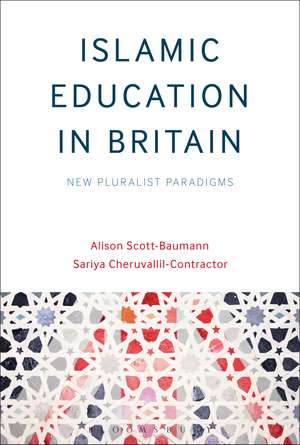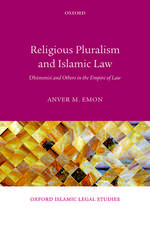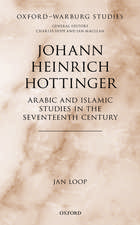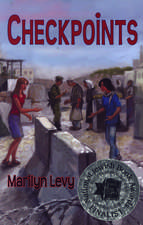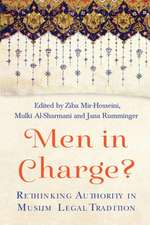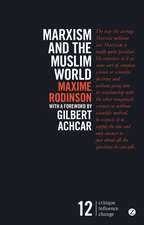Islamic Education in Britain: New Pluralist Paradigms
Autor Dr Alison Scott-Baumann, Sariya Cheruvallil-Contractoren Limba Engleză Paperback – 22 mar 2017
| Toate formatele și edițiile | Preț | Express |
|---|---|---|
| Paperback (1) | 257.03 lei 43-57 zile | |
| Bloomsbury Publishing – 22 mar 2017 | 257.03 lei 43-57 zile | |
| Hardback (1) | 773.55 lei 43-57 zile | |
| Bloomsbury Publishing – 26 aug 2015 | 773.55 lei 43-57 zile |
Preț: 257.03 lei
Preț vechi: 330.95 lei
-22% Nou
Puncte Express: 386
Preț estimativ în valută:
49.20€ • 53.46$ • 41.35£
49.20€ • 53.46$ • 41.35£
Carte tipărită la comandă
Livrare economică 21 aprilie-05 mai
Preluare comenzi: 021 569.72.76
Specificații
ISBN-13: 9781350026902
ISBN-10: 1350026905
Pagini: 240
Dimensiuni: 156 x 234 x 19 mm
Greutate: 0.34 kg
Ediția:NIPPOD
Editura: Bloomsbury Publishing
Colecția Bloomsbury Academic
Locul publicării:London, United Kingdom
ISBN-10: 1350026905
Pagini: 240
Dimensiuni: 156 x 234 x 19 mm
Greutate: 0.34 kg
Ediția:NIPPOD
Editura: Bloomsbury Publishing
Colecția Bloomsbury Academic
Locul publicării:London, United Kingdom
Caracteristici
An accessible analysis of provision for classical Islamic Studies in Britain that includes the voices of Muslim women, men and young people
Notă biografică
Alison Scott-Baumann is Professor of Society and Belief at the Centre of Islamic Studies, SOAS, University of London, UK.Sariya Cheruvallil-Contractor is Research Fellow in Faith and Peaceful Relations at the Centre for Trust, Peace and Social Relations, Coventry University, UK.
Cuprins
AcknowledgementsForeword, Tim WinterIntroduction: Islamic Education in Pluralist Britain Page 1Chapter 1: British Islam and Islamic Education - Two Approaches Page 12Chapter 2: Mapping Islamic Studies provision in BritainChapter 3: More than Imams: new narratives of Muslim faith leadershipChapter 4: Arabic: the centrality of a living world languageChapter 5: Muslim women's voices, feminisms and theologiesChapter 6: Universities and Muslim colleges: 'Collaborative Partnerships' in Higher EducationConclusion: New paradigms for Islam in educationAfterword, Shuruq NaguibBibliography
Recenzii
This book opens up new opportunities for research and practice towards understanding Islam in the British context, and marks a significant contribution for a wide audience of educational researchers, higher education stakeholders, and policymakers alike ... The language is accessible ... For academics, it remains an informative overview of Islamic education provision in the UK and offers a new approach to its challenges.
This book is a rich resource for understanding Islam in Britain from two authors with significant relevant research experience ... Scott-Baumann and Cheruvallil-Contractor make an important contribution to a conversation which needs to happen about education, Islam and Britain.
This is a book not just for educationalists, but anyone interested in obtaining a well-informed, nuanced view of an important aspect of British Muslim institutional life and the factors that motivate young Muslims to enroll in Islamic Studies courses.
This is a useful book that synthesises the work of two energetic British researchers who, separately and together, have done a great deal to map and explain the terrain of Islamic education in Britain. Based on strong empirical and interdisciplinary foundations, they describe the complexity of this field of study with intelligence, sensitivity and insight, and their work will be of value to educationalists from a wide range of institutions.
This book is extremely encouraging, motivating and inspiring. I believe it to be invaluable for those who wish to know more about Islamic Education in Britain of today. By fostering the interdisciplinary approach, the authors seek to highlight the participation and inclusion of Muslims within the UK educational structure, enabling a way to preserve cultural, linguistic and religious practice, essential for the British Muslim Identity.
An admirable and significant work that elucidates the gaps, and argues for a greater need for understanding various standards of education, offered under a broader rubric of 'Islamic education' in Britain. The book is written for a diverse audience, and it enables academics, communities and policy makers to see the necessity for dialogue.
This remarkable contribution to religious education is a paradigm for intercultural and interfaith understanding. Written by two academics with deep knowledge of the subject, and importantly of the communitie, this is an authentic exploration of a timely issue.
This book is a rich resource for understanding Islam in Britain from two authors with significant relevant research experience ... Scott-Baumann and Cheruvallil-Contractor make an important contribution to a conversation which needs to happen about education, Islam and Britain.
This is a book not just for educationalists, but anyone interested in obtaining a well-informed, nuanced view of an important aspect of British Muslim institutional life and the factors that motivate young Muslims to enroll in Islamic Studies courses.
This is a useful book that synthesises the work of two energetic British researchers who, separately and together, have done a great deal to map and explain the terrain of Islamic education in Britain. Based on strong empirical and interdisciplinary foundations, they describe the complexity of this field of study with intelligence, sensitivity and insight, and their work will be of value to educationalists from a wide range of institutions.
This book is extremely encouraging, motivating and inspiring. I believe it to be invaluable for those who wish to know more about Islamic Education in Britain of today. By fostering the interdisciplinary approach, the authors seek to highlight the participation and inclusion of Muslims within the UK educational structure, enabling a way to preserve cultural, linguistic and religious practice, essential for the British Muslim Identity.
An admirable and significant work that elucidates the gaps, and argues for a greater need for understanding various standards of education, offered under a broader rubric of 'Islamic education' in Britain. The book is written for a diverse audience, and it enables academics, communities and policy makers to see the necessity for dialogue.
This remarkable contribution to religious education is a paradigm for intercultural and interfaith understanding. Written by two academics with deep knowledge of the subject, and importantly of the communitie, this is an authentic exploration of a timely issue.
